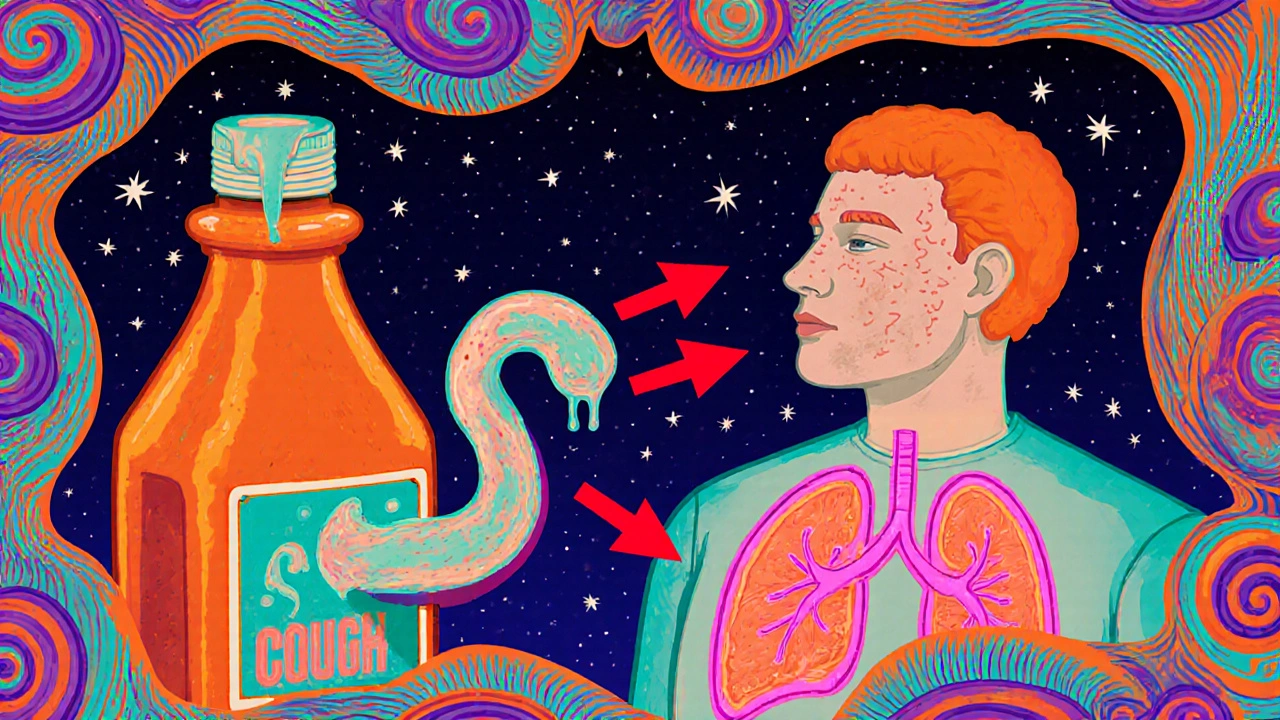
Most people know guaifenesin as the ingredient in cough syrups that helps loosen mucus when you’re sick. But online, a growing number of people are claiming it clears their acne, reduces redness, and even smooths out rough skin. Some swear by it. Others say it does nothing. So what’s real? Can a drug meant for your lungs actually help your skin?
What is guaifenesin, really?
Guaifenesin is an expectorant. It’s been used since the 1950s to thin and loosen mucus in the respiratory tract, making it easier to cough up. It’s in brands like Mucinex, Robitussin, and countless generic versions. The FDA approved it for oral use, and it’s considered safe when taken as directed. But it’s never been approved for skin use. That’s important.
How it works in the body is simple: guaifenesin increases the water content in mucus. That’s why it helps with chest congestion. Some people think this same mechanism might work on the skin-by pulling out excess oil, dead cells, or toxins trapped under the surface. But the skin isn’t the lungs. There’s no direct pathway for guaifenesin taken orally to reach the deeper layers of skin tissue in a way that would thin sebum or clear pores.
Where did the guaifenesin-for-acne idea come from?
The trend started around 2018 on Reddit and TikTok. Users reported clearer skin after taking high doses of guaifenesin-sometimes 1,200 mg to 2,400 mg per day, far above the typical 600 mg dose for coughs. They claimed their skin became less oily, breakouts decreased, and even cystic acne improved. Some posted before-and-after photos. The results looked dramatic.
But here’s what those posts didn’t tell you: most of these users were also following a strict low-glycemic, dairy-free diet. Others were using topical retinoids or antibiotics. The guaifenesin might have been just one part of a bigger change. In science, we call this a confounding variable. Without controlled studies, it’s impossible to say if guaifenesin was responsible-or if the diet, stress reduction, or other treatments were.
Is there any real science behind guaifenesin and skin?
Not much. A quick search through medical databases like PubMed shows zero peer-reviewed clinical trials on guaifenesin for acne, rosacea, or any skin condition. There are no studies measuring its effect on sebum production, inflammation, or bacterial growth on the skin.
One 2015 study in the Journal of Dermatological Science looked at how certain drugs affect skin hydration and barrier function. Guaifenesin wasn’t tested. Another 2020 review on acne treatments listed over 30 approved or experimental therapies-guaifenesin wasn’t mentioned once.
What we do know is that guaifenesin is poorly absorbed through the skin. Even if you applied it topically, it wouldn’t penetrate deeply enough to affect sebaceous glands. The skin’s outer layer, the stratum corneum, is designed to block foreign substances. That’s why topical acne treatments like benzoyl peroxide and adapalene are formulated to penetrate-guaifenesin isn’t.
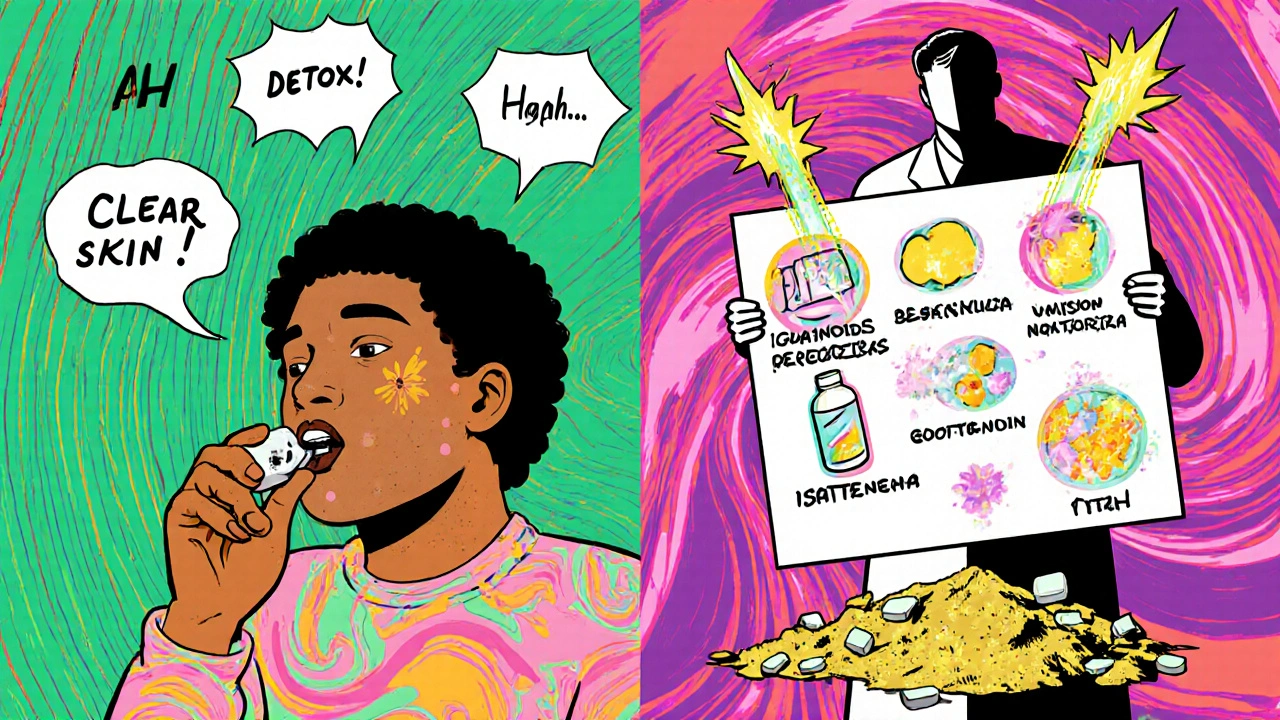
What about the theory that guaifenesin flushes out toxins?
This is a common claim among users: “It detoxes your skin.” But the human body doesn’t store toxins in the skin waiting to be flushed out. Your liver and kidneys handle detoxification. The skin is an organ of elimination only in the sense that it sheds dead cells and releases sweat. It doesn’t hold onto harmful chemicals like a sponge.
There’s no scientific definition of “toxins” in this context. When people say “toxins,” they usually mean environmental pollutants, hormones, or metabolic waste. But these are processed internally, not stored in the epidermis. Even if guaifenesin increased fluid movement in the body-which it does in the lungs-it wouldn’t selectively target “skin toxins.” That’s a myth.
Could guaifenesin help with anything skin-related?
There’s one small possibility: if you have a condition called keratosis pilaris-those tiny, rough bumps on the backs of your arms-some dermatologists have experimented with oral medications that affect skin cell turnover. Guaifenesin has been anecdotally reported to help, but again, no studies back this up. One small case series from 2021 (not peer-reviewed) described three patients who saw mild improvement after taking 1,200 mg daily for six weeks. But without a control group, placebo effect can’t be ruled out.
For acne, rosacea, or eczema? No evidence. For oily skin? No mechanism. For clogged pores? No proof it reaches them.
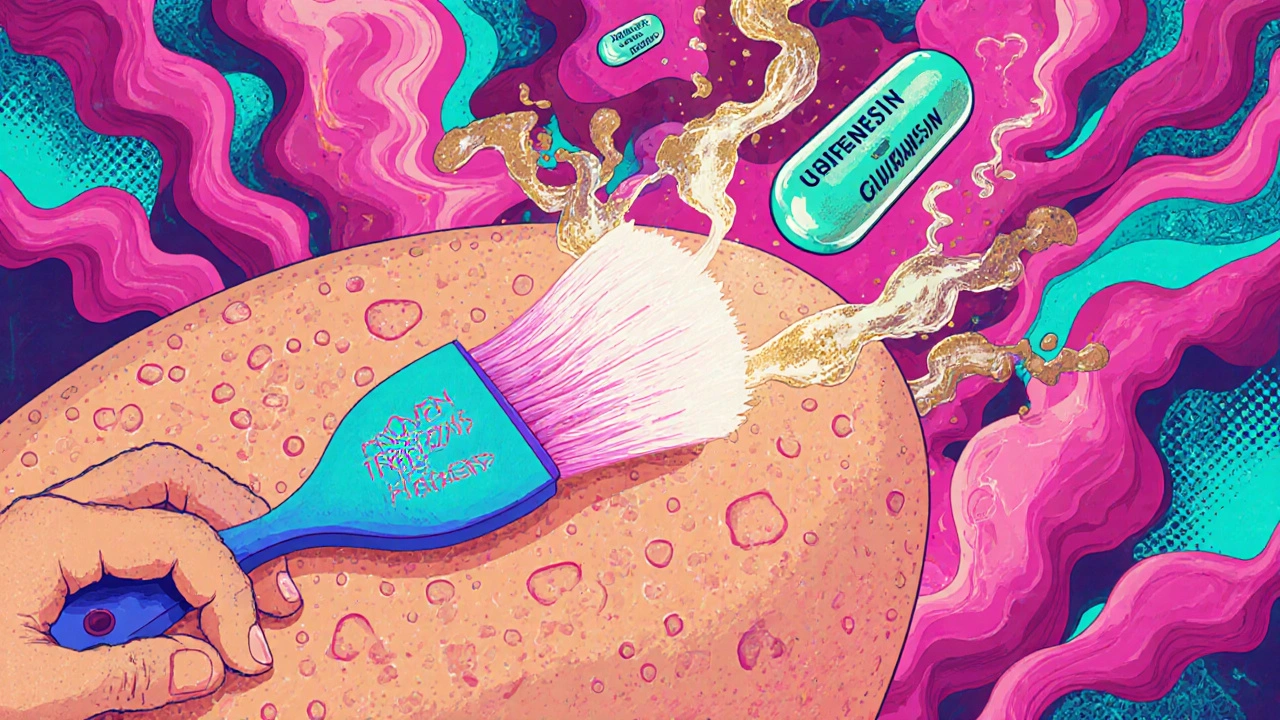
What are the risks of taking guaifenesin for skin?
At normal doses (600 mg twice daily), guaifenesin is very safe. Side effects are mild: dizziness, nausea, or headache. But people trying it for skin often take much higher doses-up to 2,400 mg per day. That’s double the maximum recommended daily dose for coughs.
Long-term high doses haven’t been studied. Potential risks include:
- Dehydration (guaifenesin increases fluid excretion)
- Electrolyte imbalance
- Kidney strain from excess fluid processing
- Interactions with other medications like diuretics or blood pressure drugs
Also, if you’re taking guaifenesin instead of proven acne treatments, your condition could worsen. Acne left untreated can lead to scarring. Cystic acne, in particular, needs medical intervention-topical retinoids, antibiotics, or even isotretinoin. Delaying real treatment for an unproven remedy isn’t worth the risk.
What actually works for acne and skin health?
If you’re struggling with acne, here’s what science says works:
- Topical retinoids (tretinoin, adapalene): Clear pores, reduce inflammation, prevent new breakouts
- Benzoyl peroxide: Kills acne-causing bacteria, reduces redness
- Salicylic acid: Exfoliates inside pores, good for blackheads
- Oral antibiotics (doxycycline, minocycline): For moderate to severe inflammatory acne
- Hormonal therapy (spironolactone, birth control pills): For women with hormonal acne
- Isotretinoin: For severe, treatment-resistant acne
For general skin health, focus on:
- Moisturizing daily (even oily skin needs hydration)
- Using sunscreen every day
- Reducing sugar and dairy intake (linked to acne flare-ups in some people)
- Managing stress (cortisol triggers oil production)
- Getting enough sleep and staying hydrated
These are proven, tested, and backed by decades of research. Guaifenesin isn’t on that list.
Should you try guaifenesin for your skin?
If you’re curious and already taking it for a cough, there’s no harm in noticing if your skin changes. But don’t start taking high doses just for your face.
Here’s what to do instead:
- See a board-certified dermatologist. They can diagnose your acne type and prescribe what actually works.
- Track your routine: What you eat, what you apply, when you break out. Patterns matter more than random supplements.
- Give proven treatments at least 8-12 weeks to work. Skin turnover takes time.
- If you still want to try guaifenesin, stick to the labeled dose (600 mg twice daily) and talk to your doctor first.
There’s no magic pill for clear skin. But there are real, effective treatments. Don’t waste time or money on trends without evidence. Your skin deserves better than a cough syrup myth.
Can guaifenesin clear acne permanently?
No. There is no scientific evidence that guaifenesin clears acne, let alone permanently. Acne is caused by hormones, bacteria, and clogged pores-guaifenesin doesn’t target any of these. Proven treatments like retinoids, benzoyl peroxide, or isotretinoin are the only options with long-term results.
Is it safe to take guaifenesin every day for skin?
Taking guaifenesin daily at doses higher than 1,200 mg is not recommended. The FDA hasn’t approved it for long-term use beyond cough relief. High doses can cause dehydration, electrolyte imbalances, and kidney stress. Always consult a doctor before taking any medication off-label.
Does guaifenesin work for rosacea or eczema?
No. Rosacea and eczema are inflammatory skin conditions that require targeted treatments like topical corticosteroids, calcineurin inhibitors, or light therapy. Guaifenesin has no known effect on these conditions and is not used in dermatology for them.
Can I apply guaifenesin directly to my skin?
Applying guaifenesin topically won’t help. The skin’s outer layer blocks most substances from penetrating deeply. Even if you mixed it into a cream, it wouldn’t reach the sebaceous glands or hair follicles where acne forms. It’s not formulated for skin absorption.
Why do some people say it worked for them?
People often improve their skin when they make multiple lifestyle changes at once-like cutting out dairy, sleeping more, or starting a retinoid. They may credit guaifenesin because they started taking it around the same time. This is called correlation, not causation. Without controlled studies, anecdotal reports aren’t reliable.
If your skin isn’t improving, don’t blame yourself. Blame the lack of science behind the trend. Real solutions exist-talk to a dermatologist. Your skin will thank you.

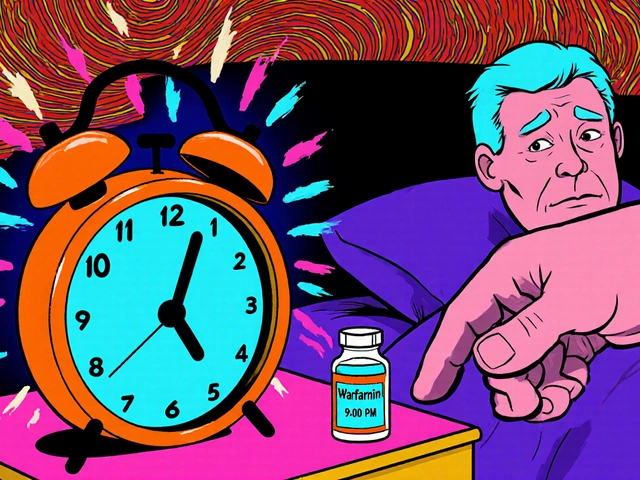
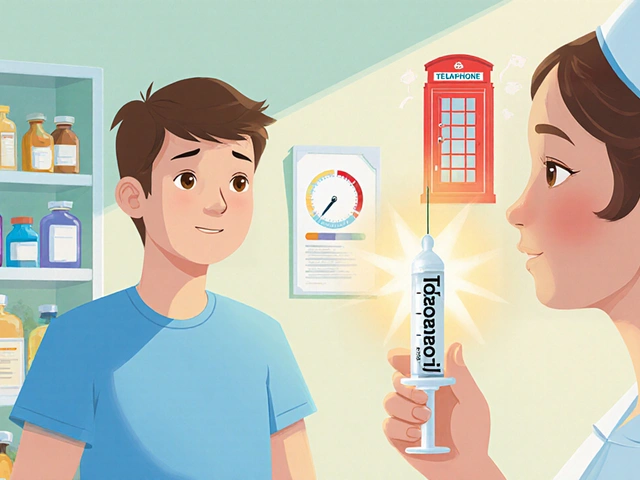

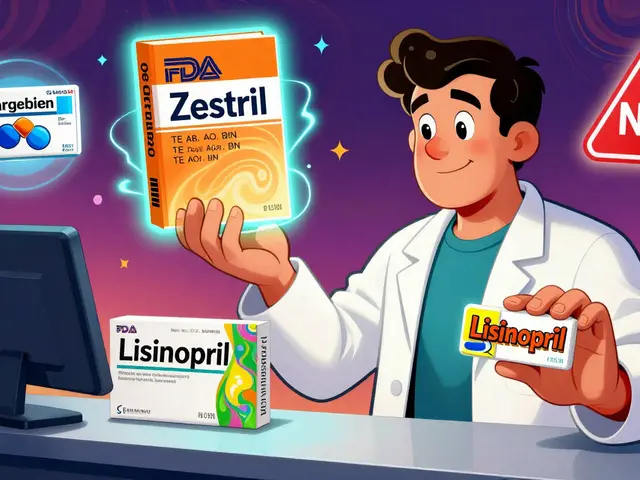
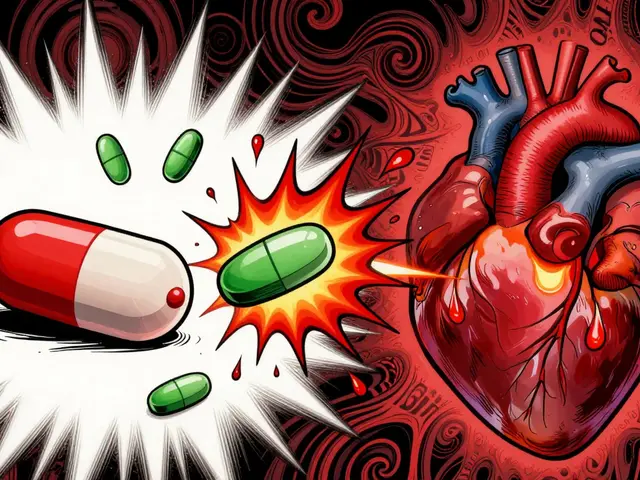
Tyler Wolfe
October 30, 2025 AT 13:08honestly i tried guaifenesin for like 3 weeks cuz everyone was posting about it on tiktok and my skin didnt change at all. maybe i wasnt taking enough? or maybe i just got lucky with my diet? idk but i stopped cuz i was drinking like 3 liters of water a day just to not feel dizzy lol
Neil Mason
November 1, 2025 AT 12:43in canada we just call it mucinex and its in every drugstore next to the cough drops. i used to take it for my colds but never thought about skin. kinda wild how internet trends turn meds into miracle cures. my aunt tried apple cider vinegar for eczema once. same energy.
Andrea Gracis
November 3, 2025 AT 09:25i had cystic acne for years and started guaifenesin after reading a reddit thread. i also cut out dairy and started using adapalene. my skin cleared up after 2 months. i still dont know which part helped most but im not complaining. just be careful with high doses tho, i got really dehydrated at first
Matthew Wilson Thorne
November 4, 2025 AT 16:39the fact that people think the skin is a ‘detox organ’ is why medicine is in crisis.
April Liu
November 6, 2025 AT 12:35you’re not alone!! i tried this too and felt so hopeful 😅 but then my derm sat me down and said ‘honey, that’s not how your body works.’ she put me on spironolactone and my skin has never been better. pls don’t risk your kidneys for a trend. you deserve real help 💛
Emily Gibson
November 6, 2025 AT 18:38thank you for writing this. i’ve been seeing so many people on instagram saying ‘guaifenesin saved my life’ and i kept wondering if i was missing something. but then i remembered how many people say the same thing about charcoal toothpaste and lemon water for acne. it’s not about the product-it’s about wanting to believe there’s a simple fix.
Mirian Ramirez
November 8, 2025 AT 04:02okay but i have to say i tried guaifenesin for keratosis pilaris and it actually made a tiny difference? like not a miracle but my arms felt a little less sandpapery after 6 weeks? i was taking 1200mg a day and drinking tons of water and honestly i think it was the hydration more than the drug? but i’m not gonna stop because it’s cheap and i’m not having side effects. also i stopped eating sugar so who knows? but if it helps someone feel better even a little why not? just dont stop your retinoids or your sunscreen
Kika Armata
November 10, 2025 AT 00:53the fact that this even needs a 2000-word breakdown is embarrassing. anyone who believes guaifenesin clears acne hasn’t opened a textbook since 2005. this isn’t ‘alternative medicine’-it’s pseudoscience dressed in TikTok filters. if you’re wasting your time on this, you’re wasting your life. go see a dermatologist. or don’t. your face, your funeral.
Herbert Lui
November 10, 2025 AT 06:24we’re all just trying to outsmart our biology, aren’t we? the body’s a messy, stubborn machine-hormones, stress, ancient genes whispering ‘make oil, make oil.’ so we grab at anything that sounds like a secret key. guaifenesin? sure. why not? it’s just a molecule trying to help mucus flow… and maybe, just maybe, it’s the ritual itself-the act of doing something-that soothes the anxiety of broken skin. we want to believe we can fix ourselves with a pill. but real healing? it’s slower. quieter. and it starts with a doctor’s office, not a comment thread.